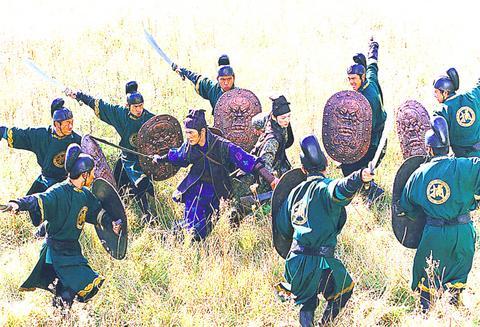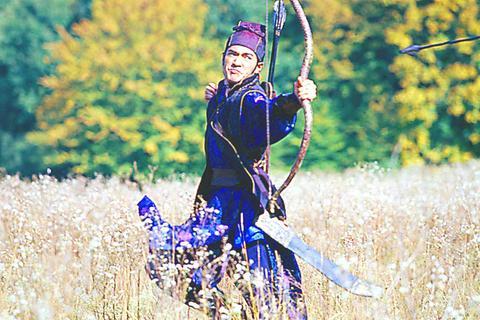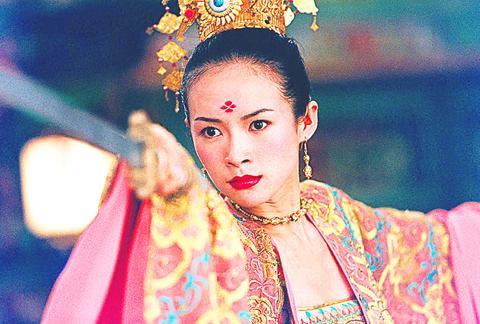Now that he feels comfortable with wuxia, or martial-arts movies, following Hero (英雄) -- his first foray into the genre, which Miramax has yet to release in North America -- Chinese master Zhang Yimou (張藝謀) creates a gem in House of Flying Daggers (十面埋伏).
While the action sequences are right up there with Crouching Tiger, Hidden Dragon(
The film is certain to be a worldwide hit, but whether it will approach the boxoffice figures of the Crouching Tiger phenomenon is an open question. Certainly, Western audiences hungering for more have a great meal headed their way.

PHOTO COURTESY OF FOX FILMS
Set in the year 859 in the waning days of the now-corrupt Tang Dynasty, the central force in the film is a shadowy revolutionary alliance known as the House of Flying Daggers. Their leader has been assassinated, but a mysterious new leader has already replaced him.
Two local deputies are ordered to capture this leader within 10 days, a virtually impossible task. Captain Leo, played by Hong Kong superstar Andy Lau (
When Mei refuses to talk even under threat of torture, Leo suggests that Jin rescue her while pretending to be a lone warrior who calls himself the Wind. The two flee, and the plan appears to work when, after a couple of spectacular battles between the couple and pursuing troops, Mei accepts Jin's faked identity.

PHOTO COURTESY OF FOX FILMS
The two head north, presumably toward the headquarters of the House of Flying Daggers. But no one is who he or she appears to be, and danger lurks everywhere. What no one anticipated, however, is that Mei and Jin would fall for each other, which causes everyone's schemes to crumble. When Jin must fight and kill his fellow soldiers for real and Mei finds herself asked to kill Jin, the divided loyalties reach their zenith.
Paying tribute to wuxia master King Hu, whose three-hour epic A Touch of Zen won a technical prize at Cannes in 1969, director Zhang honors all the conventions of the genre, including his own battle in the bamboo forest. The twist here is that the troops occupy the treetops, hurling sharpened bamboo down on the heroes who must fight and run on the ground.
As the title promises, knives and daggers zip through the air with balletic force. Flying daggers twist, plunge, ricochet and change directions. Employing the latest film technology and the most acrobatic suit people in the Chinese and Hong Kong film industries, Zhang has objects and people defy gravity in ways Hu could only dream about.

PHOTO COURTESY OF FOX FILMS
A dance sequence early in the movie featuring Zhang Ziyi and what appears to be a stunt double in some shots telegraphs viewers that the director means to raise the action bar in all areas. That he does so while keeping the story firmly rooted in the developing love between two people desperately fighting their own instincts is a tribute to his cinematic mastery.
Dashing Kaneshiro and hauntingly beautiful Zhang Ziyi convincingly convey the vulnerability of a couple battling inner emotions so that they will not fall in love. For Mei, the conflict is deepened by the fact that, unknown to Jin, she already has a lover who shadows and protects her. That lover is Lau's wily Leo, a man who will stop at nothing to keep her alive for him and for him alone.
Cinematographer Zhao Xiaoding's (

Under pressure, President William Lai (賴清德) has enacted his first cabinet reshuffle. Whether it will be enough to staunch the bleeding remains to be seen. Cabinet members in the Executive Yuan almost always end up as sacrificial lambs, especially those appointed early in a president’s term. When presidents are under pressure, the cabinet is reshuffled. This is not unique to any party or president; this is the custom. This is the case in many democracies, especially parliamentary ones. In Taiwan, constitutionally the president presides over the heads of the five branches of government, each of which is confusingly translated as “president”

Sept. 1 to Sept. 7 In 1899, Kozaburo Hirai became the first documented Japanese to wed a Taiwanese under colonial rule. The soldier was partly motivated by the government’s policy of assimilating the Taiwanese population through intermarriage. While his friends and family disapproved and even mocked him, the marriage endured. By 1930, when his story appeared in Tales of Virtuous Deeds in Taiwan, Hirai had settled in his wife’s rural Changhua hometown, farming the land and integrating into local society. Similarly, Aiko Fujii, who married into the prominent Wufeng Lin Family (霧峰林家) in 1927, quickly learned Hoklo (commonly known as Taiwanese) and

The Venice Film Festival kicked off with the world premiere of Paolo Sorrentino’s La Grazia Wednesday night on the Lido. The opening ceremony of the festival also saw Francis Ford Coppola presenting filmmaker Werner Herzog with a lifetime achievement prize. The 82nd edition of the glamorous international film festival is playing host to many Hollywood stars, including George Clooney, Julia Roberts and Dwayne Johnson, and famed auteurs, from Guillermo del Toro to Kathryn Bigelow, who all have films debuting over the next 10 days. The conflict in Gaza has also already been an everpresent topic both outside the festival’s walls, where

The low voter turnout for the referendum on Aug. 23 shows that many Taiwanese are apathetic about nuclear energy, but there are long-term energy stakes involved that the public needs to grasp Taiwan faces an energy trilemma: soaring AI-driven demand, pressure to cut carbon and reliance on fragile fuel imports. But the nuclear referendum on Aug. 23 showed how little this registered with voters, many of whom neither see the long game nor grasp the stakes. Volunteer referendum worker Vivian Chen (陳薇安) put it bluntly: “I’ve seen many people asking what they’re voting for when they arrive to vote. They cast their vote without even doing any research.” Imagine Taiwanese voters invited to a poker table. The bet looked simple — yes or no — yet most never showed. More than two-thirds of those